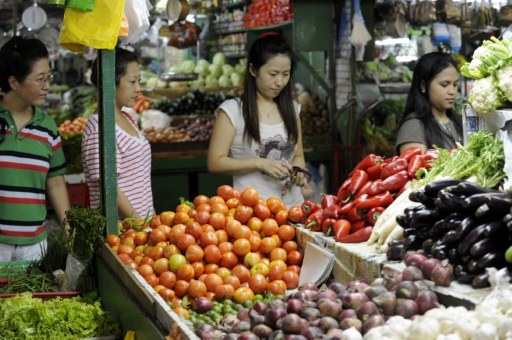Agri trade deficit widened in Q3 by 18.3% to $2.4B

Customers buy vegetables in a Manila market in this file photo. Consumer prices rose at a faster pace in October due to the effects of Typhoon “Santi” on the country’s major agriculture producers, the Bangko Sentral ng Pilipinas said. AFP FILE PHOTO
The Philippines has imported more agricultural produce following the African swine fever (ASF) outbreak and the string of typhoons that struck the country, thus widening the trade deficit in agricultural goods.
Data from the Philippine Statistics Authority (PSA) showed that total agricultural imports in the third quarter of 2021 climbed by 15.8 percent to $4.16 billion from $3.6 billion in the same period a year ago. Total agricultural exports also rose but by a smaller 12.5 percent to $1.76 billion from $1.6 billion.
As a result, the country’s agricultural trade deficit stood at $2.40 billion, 18.3 percent higher than the $2.03 billion recorded in the comparative period last year.
Total agricultural trade during the July-September period reached $5.93 billion, 14.8 percent higher than $5.16 billion a year ago.
“Imports rose because of the pork deficit as a result of ASF, series of typhoons that hit the country,” said Agriculture Undersecretary Fermin Adriano in a message.
Article continues after this advertisementMichael Ricafort, chief economist of Rizal Commercial Banking Corp., said in a message that the increased importation of pork, fish and rice at lower tariffs led to higher agricultural imports to increase local food supply in an effort to lower prices and overall inflation.
Article continues after this advertisementRicafort also said, “the wider trade deficit in agricultural goods could be attributed to higher global commodity prices in recent months that bloated the county’s import bill, including in agricultural products.”
“Relative to Q2, imports grew faster than exports. So deficit widened. [The] Philippines has high demand for agricultural products not produced efficiently here such as meat, veggie oil, rice and corn,” Roehlano Briones, senior research fellow at the Philippine Institute for Development Studies, added in a message.
The PSA report stated the top 10 commodity exports, which stood at $1.69 billion that accounted for 96.1 percent of the total, were edible fruit and nuts, peel of citrus melons, animal or vegetable fats and oils, prepared edible fats, animal or vegetable waxes, preparations of vegetables, fruit, nuts or other parts of plants, preparations of meat, of fish, or of crustaceans, molluscs and other aquatic invertebrates, tobacco and manufactured tobacco substitutes.
On the other hand, the major import commodities were cereals, meat and edible meat offal, residues and waste from the food industries, prepared animal fodder, animal or vegetable fats and oils and their cleavage products, prepared edible fats, animal or vegetable waxes and miscellaneous preparations.
Malaysia emerged as the country’s leading export partner among Association of Southeast Asian Nations (Asean) countries, equivalent to $65.45 million or a share of 34.6 percent of the total agricultural exports to the region.
In the European Union, the Netherlands was the country’s top buyer of agricultural commodities worth $162.59 million or 47.4 percent of the total agricultural exports to EU nations.
Meanwhile, Indonesia was the country’s biggest source of agricultural imports, equivalent to $401.21 million or 29.3 percent of the total imports from Asean nations.
Spain was the country’s country’s top supplier of agricultural commodities among EU countries, valued at $93.77 million or a share of 20.5 percent of the total agricultural imports from the region.
Moving forward, Ricafort said higher pork prices would still lead to higher pork imports that seek to address local supply constraints brought about by the ASF that first hit the country in 2019. INQ @jordeenelagare
By Jordeene B. Lagare